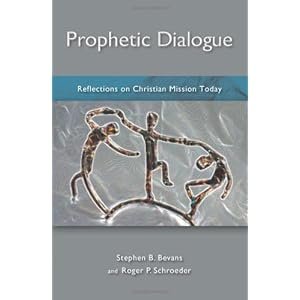 day 4 of reviewing a book a day!
day 4 of reviewing a book a day!
bevans and schroeder’s latest book prophetic dialogue is wonderful. steve bevans articulates for me better than anyone else i have ever come across what my sensibilities are about both mission and theology in a global context. with no disrespect to the previous books i have reviewed it’s a step up a few gears academically in that he is someone who is so immersed in the community and literature of missiology and theology that there is an inevitable depth, and it’s a depth that is fresh and engaging rather than dry.
constants in context is a very fat book by bevans and schroeder on mission – it’s brilliant but fat. the last section in it looks at mission in today’s world and suggests (from memory at least) three ways of thinking about that – as particpation in the life and mission of the trinity, proclamation of the kingdom of god, and prophetic dialgue. in many ways the last was the most original though the other two are equally good. and that section provoked lots of conversation and feedback. bevans and schroeder found themselves reflecting further and responding since to that conversation that was opened up. these reflections have been condensed into this (much smaller and more easily readable) book – prophetic dialogue. it’s about what it says – dialogue – essential in today’s global and multi religious and multi cultural context, but also dialogue that is prophetic – speaking out of the tradition and imagination of the prophetic gospel. they suggest (rightly in my veiw) that if you have just dialogue or just prophecy you have a much weaker sense of mission.
here’s a quote on dialogue
When we speak of mission as dialogue we are about as far away from imagining mission as ‘conquering the world for Christ’ as we probably can get. There has indeed been a radical shift, both in the world in which the church does mission and within the church’s own consciousness of the goodness and even holiness of that world…
… But the deepest reason for mission as dialogue is because of the nature of God as such, and because mission is participation in that divine dialogical nature.
and on mission as prophecy they make this amazing statement (which is actually a quote from michael amaladoss)
Prophecy might be the best single word to describe the reality of mission in today’s world
that takes a little bit of thinking about but in cms it’s what tim dakin (the community leader) has been encouraging us to reflect on for some time and i find it a very exciting notion. in fact i’m gripped by it. i articulated my sense of this in my talks at breakout if you are interested. and i intend to review another book or two on this theme if i find the time.
the standout chapter for me is on on the spirituality of inculturation. inculturation is a term for describing the process of embodying the gospel in a particular cultural context. this is how they describe what they mean
When we speak of a spirituality of inculturation we mean a whole complex of ideas and practices that can open people up to the Spirit in such a way that there emerges an understanding and expression of Christianity that takes its form in a loving, creative, and sometimes critical dialogue with a particular social or cultural context.
they then go on to explore how that spirituality will take very different postures for outsiders to a context and to insiders and this is a brilliant insight that everyone involved in crossing cultures in mission would do well to chew over. the challenge for the outsider is letting go
Outsiders need to let go of their certainties regarding the content of the gospel. They need to let go of cherished practices and ideas that have nourished and sustained them in their own journeys towards christian maturity. They need to let go of the symbols that anchor them in their human and christian identity and let go of the order that makes them comfortable…. One of the hardest and yet spiritually enriching tasks of the outsider is ‘taking leave of the gospel’ so to speak for the sake of the gospel – so that the gospel can be understood in a radically new and meaningful way among new peoples and in new circumstances.
but for the insider it is speaking out and being bold, almost the opposite
Insiders need to focus on God’s immanence, God’s nearness, God’s presence in normal everyday realities.. One needs to look for God in places where one might not look ordinarily. God is in the cracks, the corners, the neglected places – the very warp and woof of a context…
… courage to risk, to experiment, to test new formulas, try new rituals, explore new symbols, be willing to come under suspicion from those in power…
… to have pride in their culture, and their self identity, to practice the difficult task of articulating that identity proudly, to risk going too far in terms of the resources their culture or social location can bring to christian identity…
‘the positive discernment of the presence of grace’.
both are important as is the dynamic relationship between the two. as ever with these guys it’s eloquent, offered humbly as a gift to the church and it really is a gift – simply wonderful!
